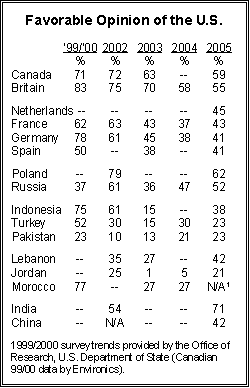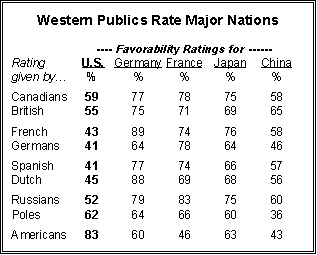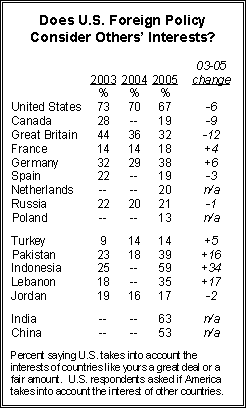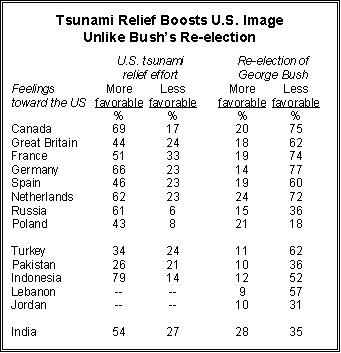Overview
 Anti-Americanism in Europe, the Middle East and Asia, which surged as a result of the U.S. war in Iraq, shows modest signs of abating. But the United States remains broadly disliked in most countries surveyed, and the opinion of the American people is not as positive as it once was. The magnitude of America’s image problem is such that even popular U.S. policies have done little to repair it. President George W. Bush’s calls for greater democracy in the Middle East and U.S. aid for tsunami victims in Asia have been well-received in many countries, but only in Indonesia, India and Russia has there been significant improvement in overall opinions of the U.S.
Anti-Americanism in Europe, the Middle East and Asia, which surged as a result of the U.S. war in Iraq, shows modest signs of abating. But the United States remains broadly disliked in most countries surveyed, and the opinion of the American people is not as positive as it once was. The magnitude of America’s image problem is such that even popular U.S. policies have done little to repair it. President George W. Bush’s calls for greater democracy in the Middle East and U.S. aid for tsunami victims in Asia have been well-received in many countries, but only in Indonesia, India and Russia has there been significant improvement in overall opinions of the U.S.
Attitudes toward the U.S. remain quite negative in the Muslim world, though hostility toward America has eased in some countries. Many Muslims see the U.S. supporting democracy in their countries, and many of those who are optimists about the prospects for democracy in the Middle East give at least some credit to U.S. policies. But progress for America’s image in these countries is measured in small steps; solid majorities in all five predominantly Muslim countries surveyed still express unfavorable views of the United States.
The polling in Western Europe, conducted in the weeks leading up to the decisive rejection of the European Union constitution by voters in France and the Netherlands, finds pockets of deep public dissatisfaction with national conditions and concern in several countries over immigration from the Middle East, North Africa and Eastern Europe.
There are no signs, however, that Euro-skepticism about the EU has fueled a desire for a closer trans-Atlantic partnership. On the contrary, most Europeans surveyed want to take a more independent approach from the U.S. on security and diplomatic affairs.
Indeed, opinion of the U.S. continues to be mostly unfavorable among the publics of America’s traditional allies, except Great Britain and Canada. Even in those two countries, however, favorable views of the U.S. have slipped over the past two years. Moreover, support for the U.S.-led war on terror has plummeted in Spain and eroded elsewhere in Europe.
 Japan, France and Germany are all more highly regarded than the United States among the countries of Europe; even the British and Canadians have a more favorable view of these three nations than they do of America. Strikingly, China now has a better image than the U.S. in most of the European nations surveyed.
Japan, France and Germany are all more highly regarded than the United States among the countries of Europe; even the British and Canadians have a more favorable view of these three nations than they do of America. Strikingly, China now has a better image than the U.S. in most of the European nations surveyed.
Attitudes toward the U.S. in the former Soviet bloc nations of Poland and Russia are much more positive than in most of Western Europe. In Russia, favorable opinion of its former Cold War adversary has swelled from 36% in 2002 to 52% currently. Opinions of the U.S. in Poland have declined since 2002, but still remain relatively positive (62%).
The latest survey by the Pew Global Attitudes Project, conducted among nearly 17,000 people in the United States and 15 other countries from April 20-May 311, finds that America’s image is strongest in India. Fully 71% in India express a positive opinion of the United States, compared with 54% three years ago.
Positive opinions of the U.S. in Indonesia, which had plummeted to as low as 15% in 2003, also have rebounded to 38%. The U.S. tsunami aid effort has been widely hailed there; 79% of Indonesians say they have a more favorable view of the U.S. as a result of the relief efforts. With the exception of Christian opinion in Lebanon, views of the U.S. in other predominantly Muslim nations are more negative and have changed little. In Turkey, hostility toward the U.S. and the American people has intensified. Nearly half of Turks (46%) say they have a very unfavorable view of Americans, up from just 32% a year ago.
Yet there is modest optimism among Muslims that the Middle East will become more democratic. And even in countries like Jordan and Pakistan, where people have low regard for the U.S., many who believe the region will become more democratic give some credit to U.S. policies for making this possible. Roughly half of respondents in Jordan and nearly two-thirds of Indonesians think the U.S. favors democracy in their countries. About half of the public in Lebanon also takes that view. But on this question and others relating to opinions of the U.S., Lebanon’s Muslim majority (about 60% of the population) is far more negative than its minority Christian population.
The survey finds that while China is well-regarded in both Europe and Asia, its burgeoning economic power elicits mixed reactions. Majorities or pluralities in France and Spain believe that China’s growing economy has a negative impact on their countries. Respondents in the Netherlands and Great Britain have much more positive reactions to China’s economic growth. Public opinion in the U.S. on this issue is divided 49% view China’s economic emergence as a good thing, while 40% say it has a negative impact on the U.S.
 Whatever their views on China’s increasing economic power, European publics are opposed to the idea of China becoming a military rival to the U.S, despite their deep reservations over American policies and hegemony. Solid majorities in every European nation except Turkey believe that China’s emergence as a military superpower would be a bad thing. In Turkey and most other predominantly Muslim countries, where antagonism toward the U.S. runs much deeper, most people think a Chinese challenge to American military power would be a good thing.
Whatever their views on China’s increasing economic power, European publics are opposed to the idea of China becoming a military rival to the U.S, despite their deep reservations over American policies and hegemony. Solid majorities in every European nation except Turkey believe that China’s emergence as a military superpower would be a bad thing. In Turkey and most other predominantly Muslim countries, where antagonism toward the U.S. runs much deeper, most people think a Chinese challenge to American military power would be a good thing.
Nonetheless, there is considerable support across every country surveyed, with the notable exception of the U.S., for some other country or group of countries to rival the United States militarily. In France, 85% of respondents believe it would be good if the EU or another country emerged as a military rival to the U.S.
Most Western Europeans want their countries to take a more independent approach from the U.S. on diplomatic and security affairs than it has in the past. The European desire for greater autonomy from the U.S. is increasingly shared by the Canadian public; 57% of Canadians favor Canada taking a more independent approach from the U.S., up from 43% two years ago. The American public, by contrast, increasingly favors closer ties with U.S. allies in Western Europe.
As in the past, the perception that the United States conducts a unilateral foreign policy is widely shared across the surveyed countries. Overwhelming percentages of people in Europe and the Middle East believe that the United States does not take their countries’ interests into account when making foreign policy. Yet there are a few notable exceptions. Majorities in India (63%) and China2(53%) believe the U.S. takes their respective countries’ interests into account at least a fair amount. The percentage in Indonesia expressing that view has more than doubled since 2003 (from 25% to 59%), probably reflecting the overwhelmingly positive reaction in response to U.S. tsunami relief in that country.
 The U.S. tsunami relief effort led to more favorable views of the U.S. for most nations surveyed. But goodwill generated by U.S. tsunami relief has been largely offset by the negative reactions to Bush’s re-election and the continuing war in Iraq. Roughly three-quarters of the publics in Germany (77%), Canada (75%) and France (74%) say Bush’s re-election has made them feel less favorable toward the U.S. And particularly in Western Europe, most of those who express an unfavorable view of the U.S. mostly blame Bush, rather than a more general problem with America.
The U.S. tsunami relief effort led to more favorable views of the U.S. for most nations surveyed. But goodwill generated by U.S. tsunami relief has been largely offset by the negative reactions to Bush’s re-election and the continuing war in Iraq. Roughly three-quarters of the publics in Germany (77%), Canada (75%) and France (74%) say Bush’s re-election has made them feel less favorable toward the U.S. And particularly in Western Europe, most of those who express an unfavorable view of the U.S. mostly blame Bush, rather than a more general problem with America.
The war in Iraq continues to draw broad international opposition, and there is scant optimism that the elections in that country this past January will foster stability. Even the American public now has diminished expectations that the January elections held in Iraq will lead to a more stable situation there. The United States and India are the only countries surveyed in which pluralities believe Saddam Hussein’s removal from power has made the world a safer place.
While the war in Iraq is as unpopular in Europe as it was in 2003 and 2004, there is still majority support for the U.S.-led war on terrorism among Western publics that are otherwise highly critical of the U.S., notably in Germany and France. But support for the war on terrorism has all but evaporated in Spain since 2003 and, notably, Canadian opinion on the American-led war on terror is now evenly divided.
Mixed Views of the American People
 The new poll finds Canadians holding increasingly negative views of both the U.S. and the American people.
The new poll finds Canadians holding increasingly negative views of both the U.S. and the American people.
In most Western countries surveyed, majorities associate Americans with the positive characteristics “honest,” “inventive” and “hardworking.” At the same time, substantial numbers also associate Americans with the negative traits “greedy” and “violent.” Canadians, who presumably have the greatest contact with Americans, agree with Europeans on the negatives, but are less likely to view Americans as honest. And Canada is the only Western nation in which a majority (53%) regards Americans as rude.
Muslim publics, including Indonesians, are highly critical of Americans in many respects. In particular, they are much more likely than others to view the American people as immoral. Yet people in predominantly Muslim countries also see Americans as hardworking and inventive.
The Chinese are also largely critical of Americans. They are the least likely of these 16 publics to consider Americans hardworking (44%) and just over a third (35%) see Americans as honest. A majority of Chinese associate Americans with being violent (61%) and greedy (57%). The one positive trait most Chinese associate with Americans is inventive (70%).
By contrast, Indians hold largely positive views of the American people. Clear majorities see Americans as inventive, hardworking and honest (86%, 81% and 58% respectively). None of the negative traits is linked with Americans by a majority in India.
 The American people’s self assessment also identifies both virtues and faults. With respect to the latter, a large percentage of the U.S. public (70%) characterizes the American people as greedy, and many also see their countrymen as violent (49%).
The American people’s self assessment also identifies both virtues and faults. With respect to the latter, a large percentage of the U.S. public (70%) characterizes the American people as greedy, and many also see their countrymen as violent (49%).
The biggest gap between the way Americans are seen by other Western countries, and the way they see themselves, is with respect to religion. Majorities in France and the Netherlands and pluralities in Great Britain and Germany see the U.S. as too religious. By contrast, a 58% majority of Americans say their country is not religious enough. On this point, Muslims find themselves in rare agreement with the American public; majorities in Indonesia, Pakistan, Lebanon and Turkey all believe the U.S. is not religious enough.
America’s international image problem is not lost on its own people. Just 26% of the U.S. public thinks the country is well-liked by people around the world. Only the Turks and Russians come close in seeing their country as internationally unpopular (30% and 32% well-liked, respectively). Canadians stand out for their nearly universal belief (94%) that other nations have a positive view of Canada.
The American public also looks at U.S. conduct in the world much differently than do publics in Europe, the Middle East and Asia. In response to a hypothetical question, Americans overwhelmingly (73%) see the U.S. as the major power most likely to come to the aid of people threatened by genocide. Only Poles, Canadians and Germans see the U.S. this way in any significant numbers. America evokes even less confidence with respect to the global environment. Fewer than one-in-ten Western Europeans surveyed most trust the U.S. in this regard. But 59% of Americans say they most trust the U.S. to do the right thing in protecting the world’s environment.


